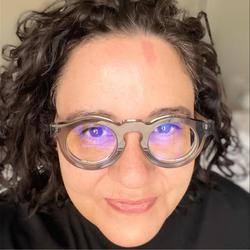Ilona Gaynor
Ilona Gaynor is an experimental designer, artist and writer. Her design work focuses on examining procedures of power across a variety of fields, images and material forms. Her approach to design is to expand its scope by inhabiting and subverting its form, context, reading and strategy. Her work is included in several permanent collections and has been exhibited, screened, published and disseminated internationally, including at the Palais de Tokyo in Paris, the Design Museum, the Victoria and Albert Museum, Theaster Gates’ Black Cinema House, the HMKV and STUK.
She currently writes for Disegno Design Journal and has written across a multitude of contexts and structural forms: from published fiction, film scripts, narrative schemata and strategy to scholarship and long-form journalism, MIT’s Twelve Tomorrows to Dirty Furniture and Yale’s Perspecta. She currently serves on the board of mentorship at the New Museum’s New INC lab for design entrepreneurs and was one of the curators of the Biennale Internationale Design Saint-Étienne. She has consulted across a wide variety of industries and companies: from Google and IDEO to Comme Des Garçons and director Ridley Scott.
She has taught extensively in industrial design, architecture and fine art in such institutions as the Architectural Association, KABK, Princeton University, the Bartlett School of Architecture and the Royal College of Art, and she was previously a professor of designed objects at SAIC. She received her MA(RCA) in Design Interactions in 2011 from the Royal College of Art and was awarded the Sir Ridley Scott prize for experimental narrative practice.
